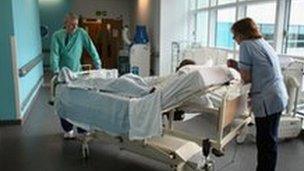Royal Cornwall Hospital bed-blocking increase
- Published

The Trust said it had "significant concerns about the time it is taking to discharge patients"
Last month saw the worst bed-blocking rates at the Royal Cornwall Hospital for four years.
A report to the Royal Cornwall Hospital Trusts Board shows "exceptionally high numbers of delayed discharges of care".
Cornwall's Acute Care at Home service will now be extended to cover the whole of the county to ease bed pressure.
The Trust said it had "significant concerns about the time it is taking to discharge patients from our hospitals".
Financial penalties
According to the report, the average bed-blocking across January equated to 35 patients per day, compared with 26 a day for January 2012, and 23 daily for the year as a whole.
Jo Gibbs, the Chief Operating Officer at the Royal Cornwall Hospitals Trust, said: "Delayed discharges mean our doctors and nurses feel they cannot provide the very best care, crowding in our Emergency Department, cancellation of planned surgery and financial penalties.
"We are doing what we can to fully support an integrated health and social care system that puts patient needs first."
Cornwall's Acute Care at Home service, which started in mid and west Cornwall in July 2012, is being extended to the rest of the county, at a cost of £800,000 a year.
It allows patients to be released early from hospital for treatment at home.
- Published24 July 2012
- Published8 November 2011
- Published10 July 2012